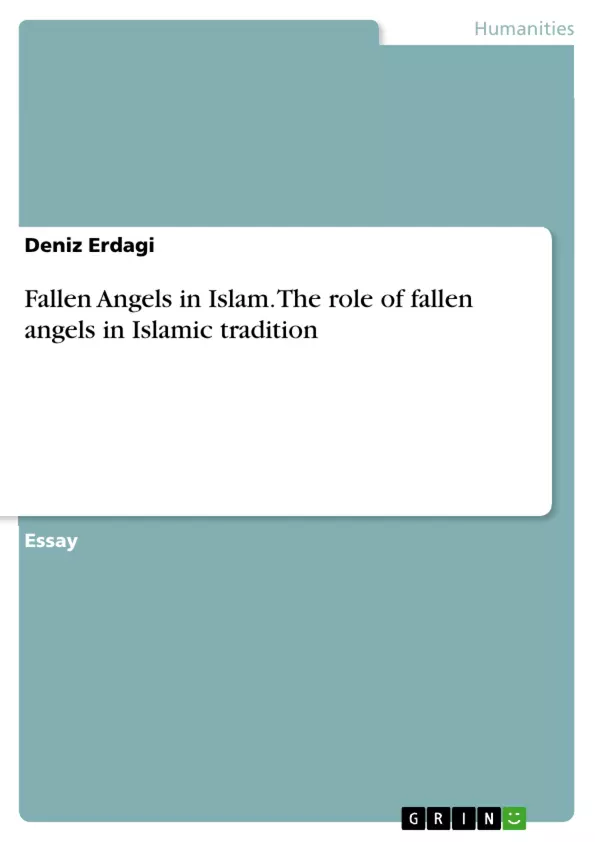The essay is based on 5 years of studying the role of angels, jinn and devils in Muslim literature, evaluating both Western academic as well as Muslim religious sources. The author himself wrote this from a believer's point of view of their own Muslim experience, and invites both Muslims to rethink the recent changes of Islamic doctrines and Western academics to set a first step into exploring the rich traditions about spiritual entities within Islam.
Remember that this is merely an essay. A deeper understanding of the discussed topics can be accessed by following the literature provided in the footnotes.
Table of Contents
- Introduction
- Satan and the fire
- Harut und Marut; fallen angels among us
- Different angelic falls
- The sin of Iblis
- How the belief of “fallen angels” brings us closer to Tawhid
Objectives and Key Themes
This essay aims to explore the concept of fallen angels within Islamic tradition, challenging the prevalent postmodern rejection of this idea. It argues for the Quranic justification of angelic fallibility by referencing earlier Muslim authors and examines how the depiction of fallen angels in Islamic narratives contributes to a deeper understanding of the core Islamic doctrine of Tawhid (the unity of God).
- The possibility of angelic error in Islamic theology.
- The nature and story of Satan (Iblis) in the Quran and its interpretations.
- The contrasting views on the nature of Iblis (angel vs. jinn).
- The role of Harut and Marut in the discussion of fallen angels.
- The connection between the belief in fallen angels and the concept of Tawhid.
Chapter Summaries
Introduction: This introductory section establishes the contrasting perspectives on fallen angels in Christianity and Islam. While Christianity canonized the concept, certain Muslim scholars rejected it, emphasizing the servitude of angels to God. The essay outlines its approach: demonstrating the Quran's justification for angelic error through referencing earlier Muslim authors; examining the portrayal of fallen angels within Islamic tradition; and finally, showcasing how the concept of fallen angels strengthens the core Islamic doctrine of Tawhid.
Satan and the fire: This chapter delves into the debate surrounding Satan's (Iblis') nature and the angelic pair Harut and Marut as prime examples of the discussion on angelic fallibility. It analyzes the Quranic accounts of Satan's refusal to prostrate before Adam, focusing on Iblis's justification for his disobedience, which is presented as arrogance rather than simple rebellion. The chapter also explores conflicting interpretations of Quranic verses that describe Iblis as a jinn, leading to the debate about whether Satan was an angel who fell or a jinn from the beginning. Different interpretations and the use of terms like "fire" (nar) and "light" (nur) are examined within their specific Islamic context.
Keywords
Fallen angels, Islam, Quran, Iblis, Satan, Harut and Marut, Jinn, Tawhid, Angelic fallibility, Islamic theology, Postmodernism.
Frequently Asked Questions: A Study of Fallen Angels in Islamic Tradition
What is the main topic of this essay?
This essay explores the concept of fallen angels within Islamic tradition, specifically challenging the postmodern rejection of this idea. It argues for the Quranic justification of angelic fallibility and examines how the depiction of fallen angels in Islamic narratives contributes to a deeper understanding of Tawhid (the unity of God).
What are the key themes explored in the essay?
Key themes include the possibility of angelic error in Islamic theology; the nature and story of Satan (Iblis) in the Quran and its interpretations; contrasting views on Iblis's nature (angel vs. jinn); the role of Harut and Marut; and the connection between the belief in fallen angels and the concept of Tawhid.
What is the essay's approach to the topic?
The essay demonstrates the Quran's justification for angelic error by referencing earlier Muslim authors; examines the portrayal of fallen angels within Islamic tradition; and showcases how the concept of fallen angels strengthens the core Islamic doctrine of Tawhid.
What are the main chapters and their summaries?
The essay includes an introduction establishing contrasting perspectives on fallen angels in Christianity and Islam. The main body delves into the debate surrounding Satan's nature, analyzing Quranic accounts and conflicting interpretations. It also examines the angelic pair Harut and Marut as examples of angelic fallibility.
Who are Harut and Marut, and what is their significance?
Harut and Marut are an angelic pair mentioned in the Quran, and their story is relevant to the discussion of angelic fallibility. The essay analyzes their role in this context.
What is the significance of Iblis (Satan) in this essay?
The essay extensively analyzes the Quranic accounts of Iblis's refusal to prostrate before Adam, focusing on his justification for disobedience. It explores conflicting interpretations regarding Iblis's nature (angel vs. jinn) and examines the use of terms like "fire" and "light" within their specific Islamic context.
What is the connection between fallen angels and Tawhid?
The essay argues that the belief in fallen angels strengthens the core Islamic doctrine of Tawhid (the unity of God). It explores how this concept enhances understanding of God's power and sovereignty.
What are the key terms and concepts used in this study?
Key terms include: Fallen angels, Islam, Quran, Iblis, Satan, Harut and Marut, Jinn, Tawhid, Angelic fallibility, Islamic theology, Postmodernism.
- Quote paper
- Deniz Erdagi (Author), 2022, Fallen Angels in Islam. The role of fallen angels in Islamic tradition, Munich, GRIN Verlag, https://www.grin.com/document/1286436




